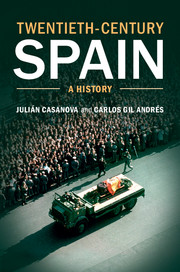Book contents
- Frontmatter
- Contents
- List of illustrations
- Key figures
- List of abbreviations
- Twentieth-century Spain timeline
- Maps
- Introduction
- Part I The monarchy of Alfonso XIII
- 1 The legacy of a century
- 2 The ‘revolution from above’
- 3 The crisis of the Liberal regime
- 4 The Primo de Rivera years
- Part II The Second Republic
- Part III The Civil War
- Part IV Franco’s dictatorship
- Part V Transition and democracy
- Guide to further reading
- Index of names and authors
- References
3 - The crisis of the Liberal regime
Published online by Cambridge University Press: 05 July 2014
- Frontmatter
- Contents
- List of illustrations
- Key figures
- List of abbreviations
- Twentieth-century Spain timeline
- Maps
- Introduction
- Part I The monarchy of Alfonso XIII
- 1 The legacy of a century
- 2 The ‘revolution from above’
- 3 The crisis of the Liberal regime
- 4 The Primo de Rivera years
- Part II The Second Republic
- Part III The Civil War
- Part IV Franco’s dictatorship
- Part V Transition and democracy
- Guide to further reading
- Index of names and authors
- References
Summary
Most experts are in agreement, in general terms, that the 1917 crisis represented a watershed for the legitimacy of the political system of the Restoration. The praetorian threat of the secret Juntas de Defensa, the demands of the Asamblea de Parlamentarios (a series of unofficial meetings between Catalan and national deputies and senators to discuss political problems) and calls for revolutionary strikes by the workers posed a serious challenge to the state. The regime survived, but it was incapable of undertaking the reforms needed to broaden its social and political base and successfully tackle an orderly transition to democracy. The governments of those years were weak and unstable, sustained by parties split into factions and interests that occupied a fragmented Parliament, and they were incapable of getting ambitious projects off the ground such as those that had been tackled by Maura and Canalejas in the previous decade.
They failed because, as well as the economic and social impact of the Great War, there were problems deriving from the corporativism of the army, the authoritarianism of the Crown, escalation of the Moroccan conflict, the intensity of trade union mobilisation and public protests, reminiscent of the Russian revolution, nationalist demands and the defection of conservative sectors, Catholic associations and employers’ groups, which were increasingly in favour of anti-parliamentary solutions. This situation went on until September 1923, when Miguel Primo de Rivera, the captain general of Catalonia, declared a state of emergency and demanded that power be handed over to him. There was hardly any opposition. The coup d’état saw the overthrow of the Constitution and the beginning of a military dictatorship.
- Type
- Chapter
- Information
- Twentieth-Century SpainA History, pp. 59 - 83Publisher: Cambridge University PressPrint publication year: 2014



